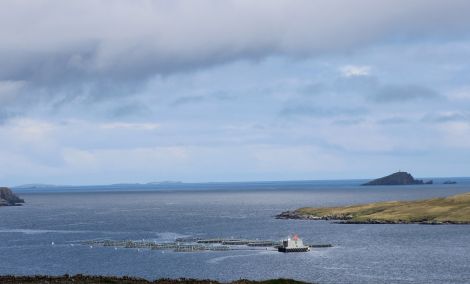Council / Crown estate funding scheme gets green light
COUNCILLORS have given the green light for a new fund to be established which could distribute grants ranging from £10,000 to £100,000 to community groups and charities.
The scheme, which will disburse money received from Crown Estate Scotland, is set to run as a pilot through to September 2021.
It was approved by elected members at a meeting of the full Shetland Islands Council (SIC) on Monday.
A motion presented by council leader Steven Coutts approved by elected members means that any applications for funding over £50,000 will be determined by councillors.
Any applications under this value will go to a panel of SIC officers which will be chaired by development committee chief councillor Alastair Cooper.
Administration of the scheme will be co-ordinated by staff in the development services department.
The SIC has been allocated over £2.3 million in the last two financial years from revenue generated by Crown Estate Scotland assets out to 12 nautical miles.
For decades the revenues the Crown Estate generated from owning and managing the seabed out to 12 nautical miles, as well as other assets such as forests and commercial property, were regarded as unjustified by many in the islands including local politicians, salmon farmers and harbour authorities.
Since last year, and following years of negotiations, a greater proportion of Scottish Crown Estate revenues is now redistributed to local authority areas with a coastline – with Shetland, Orkney, Highlands and the Western Isles the main beneficiaries.
The new fund is designed to “mobilise change and deliver positive outcomes for Shetland and its communities”.
Eligible applicants will include registered charities, community groups, voluntary organisations, social enterprises and local authority departments.
A report presented to councillors highlighted that it could deliver against local priorities for recovery and renewal from Covid-19 over the coming months and years.
Become a member of Shetland News
Grants outside the typical £10,000 to £100,000 range may be considered in “exceptional circumstances”.
An amendment was presented by Lerwick councillor John Fraser asking for the terms of the scheme to be altered to allow religious groups to apply for funding for non-religious activities, but it lost out in a vote against Coutts’ motion.
He said religious organisations “can be the catalyst for projects that provide community benefit” beyond their own memberships.
The failure of the amendment to gain support means that religious groups will be unable to apply for funding. Political groups also cannot take part.
During questioning from westside member Catherine Hughson acting manager of the SIC’s economic development service Tommy Coutts said as it was a council scheme he did not feel it would be appropriate to include an independent person on the panel.
Hughson – who stressed the importance of social benefit from the scheme – said she disagreed with this due to the “wide ranging nature” of the fund.
Tommy Coutts also said that as the scheme would be a pilot it would effectively be a “live consultation” which could allow certain alterations take place.
Council leader Steven Coutts, meanwhile, said the council had a “significant track record” in delivering grants to the community, especially from the economic development service.
“This is about additionally in terms of projects, and it’s about council decision making and openness and transparency,” he said.
The westside councillor proposed a motion to approve the scheme but with a few alterations, which included elected members deciding on applications over £50,000 – something which development committee chairman Cooper supported.
Shetland Central member Davie Sandison asked for clarification that the motion meant there would be no right to appeal – with Steven Coutts confirming that would be the case.
He said he had “full faith” in officers to make the right decision in the first instance.
South mainland member George Smith, meanwhile, admitted he was “puzzled” to see public bodies in the list of eligible applicants.
Hughson requested that an external body is represented on the panel for applications under £50,000 as they could bring “knowledge and experience outwith the council”.
Steven Coutts, however, said that he had faith in council officers to make decisions with the “Shetland community in mind”.
Shetland central member Ian Scott, meanwhile, said he felt local democracy would be best served with a greater engagement with communities.
“If we are serious about engaging with the community, we should be engaging with the community councils for instance,” he said.
Scott said he believed community councils should have been contacted months ago.
He added that applications of more than £50,000 is an “incredibly large amount of money to be delegated to a handful of people”.
Coutts’ motion received 12 votes while Fraser’s amendment received three votes, with four members abstaining.
Become a member of Shetland News
Shetland News is asking its readers to consider paying for membership to get additional perks:
- Removal of third-party ads;
- Bookmark posts to read later;
- Exclusive curated weekly newsletter;
- Hide membership messages;
- Comments open for discussion.
If you appreciate what we do and feel strongly about impartial local journalism, then please become a member of Shetland News by either making a single payment, or setting up a monthly, quarterly or yearly subscription.

















































































